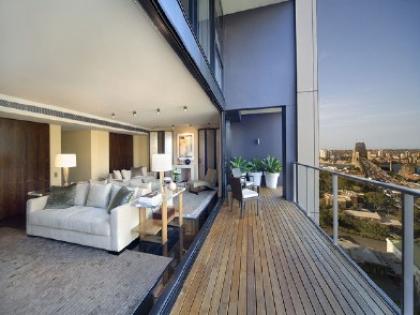- any decaying timber that forms part of the balcony or deck
- discoloured or blistered paint
- depression of timber
- termite nests
- any build-up of soil around the base of the timber
- fine ‘sawdust’ type material around or below the timber as this can signal that termites are active
- don’t install heavy objects on your deck or balcony (eg. a spa) unless it has been designed to withstand the load
- avoid excessive jumping, dancing or movement
- avoid having large numbers of people on a balcony or deck at once
- the older the balcony or deck, the more its ability to withstand loads
- bending or stress of post brackets
- deterioration of nuts, bolts, screws or nails
- rusting metal.
Now is the time to check your balcony or deck:It's worth checking your balcony or deck before heavy use starts in summer.
Date: October 23 2012

Home owners and renters are being urged to check their balcony or deck in time for summer.
“The summer season is a time when larger groups of people gather on decks, so now is the time to check them,” said the South Australian State Manager of Archicentre, Edward Lukac.
Archicentre is a network of accredited, professional building design and inspection experts wholly owned by the Australian Institute of Architects.
“Unfortunately, we hear of collapses causing injury or death too often. The legal and insurance issues that can follow a balcony or deck collapse can be all-consuming especially if an investigation finds that the deck or balcony was illegally built of badly maintained.”
Mr Lukac urged everyone with a balcony or raised deck, whether it is constructed of timber, steel or concrete, to check it out carefully for safety, including an inspection for rotting timbers, shaky hand rails or balustrades, rusting bolts and brackets, rust stains or cracking in concrete balconies.
"Often during pre-purchase property inspections or specific deck checks, Archicentre Architects discover rotting timbers and corroded steel fittings that could substantially weaken the deck's structure".
"Balconies and decks can often be an area overlooked for maintenance because of the outdoor location," Mr Lukac said.
"Properties at or near the coast are in a high risk category because of the harsh environment and corrosive conditions."
Mr Lukac said that coastal holiday homes are often where owners decide to build a balcony or deck as a ‘DIY’ project. In these instances, he said it is important for home owners to obtain development and/or building approval, if required, before commencing building to ensure the soundness and compliance of the new structure.
Here are some of the signs to look for in your balcony or deck:
Further information:
Contact your local Council or arrange an inspection through an accredited expert.
|
||||||||














__small.png)










